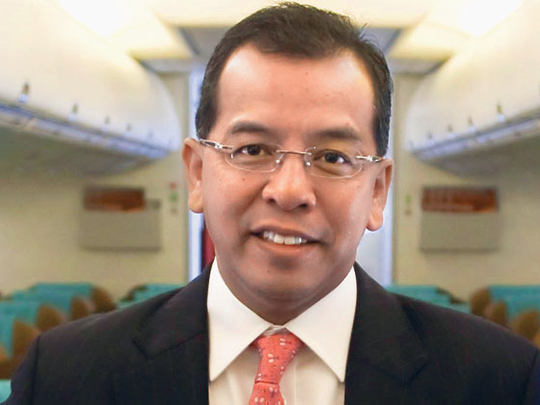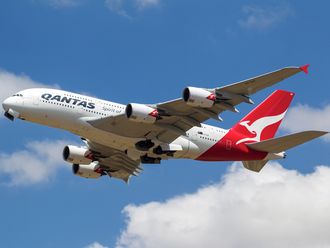
Dubai :Nascent airlines of the Gulf are on the growth trajectory in the relatively young phase of their life, but a much older airline, Garuda Indonesia, is in the midst of its aggressive revamp and expansion plan it calls as the "quantum leap" to bring the airline to the top of the industry by 2014.
New livery (paint scheme of an aircraft) and a new logo saw the start of its mission to revamp itself and includes new routes in domestic and international market that will lead the airline to carry 27.6 million passengers by 2014, up from 10.3 million in 2009.
Garuda Indonesia is still recovering from a flying ban to the European Union in 2007 placed over security concerns.
In March the same year, Garuda Indonesia Flight 200, a Boeing 737-400 flying from Jakarta, crashed and exploded on landing at Adisucipto International Airport, Yogyakarta, killing about 20 people. After struggling with authorities for a long time, the ban was lifted in July last year.
Heading into a time of strength development with new routes and new aircraft on delivery that will increase fleet size to 116 in four years from a current 71. The fleet will have 25 new Boeing 737-800s, with the option for 25 more and 10 new B777-300s.
Meanwhile, to sustain its growth plans the carrier is planning an Initial Public Offering (IPO) later this year that could raise $300 million (Dh1 billion).
In an exclusive interview with Gulf News, Emirsyah Satar, president and chief executive of Garuda Indonesia talks about the airline's plans.
Gulf News: Which destinations are you looking at as you expand Garuda's network?
Emirsyah Satar: On June 1 this year, we started a daily non-stop service from Jakarta to Dubai and on to Amsterdam. The introduction of this service marks a significant step forward in Garuda Indonesia's global network strategy.
Amsterdam is the first of a number of key European routes Garuda plans to fly to. The other routes include Frankfurt, Paris and London and Rome which Garuda Indonesia will launch as part of its international expansion over the next few years.
Over the next five years, we plan to increase domestic departures by double to 2,072 per week. We also serve the capital's entire provinces across Indonesia.
On a more regional front, we launched non-stop services from Jakarta to Sydney and Melbourne in Australia as well as Shanghai and Seoul last year. Moving forward, we're looking to add more frequencies on the Jakarta-Singapore, Jakarta-Hong Kong routes this year. We will also introduce new routes including Jakarta-Taipei We plan to increase international departures by over 300 per cent to 1,222 a week by 2014. We will also launch direct Jakarta - Tokyo on 31 August 2010.
How important is the Middle East market to the airline? Would you be increasing your presence here?
Middle East is very important market for Garuda Indonesia. We give special attention to this market because of its enormous potential for pilgrimage trips from Indonesia. We currently have daily flights to Saudi Arabia — namely Riyadh, Jeddah and Dammam. The launch of the new route to Dubai also marks a significant step in our expansion plans for the Middle East particularly the UAE market.
How are you planning on driving traffic away from nearby hubs such as Singapore and Malaysia towards Jakarta/Denpasar?
In line with the arrival of the new wide-body aircraft in the future, we are able to fly non-stop to long-haul haul destinations. This will help drive traffic directly to Jakarta.
Where are you planning to list? How much capital would you like to raise?
We plan to list on the Indonesian stock exchange by the end of this year. We've received approval from the legislative and shareholder to float up to 40 per cent of the shares and plan to raise about $300 million.
It seems that Garuda took a slighter hit during the downturn than other industry players.
At a time when most carriers were announcing poor performance and reducing capacity, Garuda Indonesia reported a net profit of 669 billion Indonesian rupiah (Dh270 million) in 2008 and our 2009 results was 1,009 billion rupiah.
This is largely due to the fact that we have a very strong domestic market unlike other regional carriers, which gave us a distinct advantage and steady demand in weathering the downturn.
Indonesia's domestic air travel market has more than tripled to over 34 million passengers a year, from about 9 million in 2001.
The airline is now going in an aggressive expansion mode.
It took us a lot of hard work and major restructuring over the last few years but we're now finally back on track.
Over the next five years, we aim to increase net profit to $370 million in 2014. To achieve this, we plan to grow our fleet from the current 71 to 116 aircraft as well as increase domestic departures by over 150 per cent to 2,072 per week and international departures more than threefold to 1,222 a week by 2014.
What will you do to keep security and safety levels high at the airline as to avoid future incidences of bans?
Garuda Indonesia has been improving its safety issues by building a safety management system and assigning more specialised staff. At the same time, we brought in international aviation safety expert George Snyder to help with the airline's safety issues in 2008.
Since then, Garuda Indonesia saw a decline in reported accidents from a peak of 1.11 per 1,000 departures in 2004 to 0.04 in 2008 and we're looking at reducing that figure even further.
In May 2008, we became the only airline in Indonesia to receive the IATA Operations Safety Audit (IOSA) certification.
We also have code-share partnerships with other reputable airlines such as Singapore Airlines and Qatar Airways, which shows that these airlines have confidence in Garuda Indonesia.










